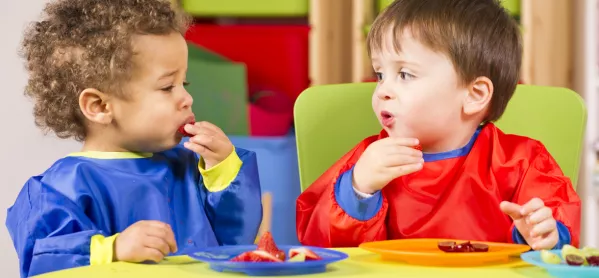- Home
- Millions in funding depends on tomorrow’s infant meals
Millions in funding depends on tomorrow’s infant meals

The number of infant pupils eating a free dinner on the Department for Education’s school census day tomorrow will determine hundreds of millions of pounds of school funding.
Some campaigners are encouraging heads to ensure pupils take up their free meal by introducing a special menu so that school budgets are maximised.
Funding per school for the DfE’s universal infant free school meals policy, introduced by the coalition government in 2014, is based on how many younger pupils take up a school dinner on the day of the census. This data will be gathered tomorrow.
News: Free infant lunches policy doubled take-up of school meals
Quick-read: Thousands sign heads’ petition to save universal free school lunches for infants
The total spend on universal free school meals for infants allocated in June 2019 was £625.9 million.
However, according to headteachers, many schools are providing universal free meals for their infant classes at a loss, as funding per meal has not changed since 2015 and has not been adjusted for inflation.
And schools with pupils absent tomorrow could see their overall funding reduced. But heads encouraging pupils to take up free meals tomorrow through special menus would be able to boost their funding.
Examples of this year’s school census day menus include:
· Dinner of Nottinghamshire sausage, Yorkshire pudding, gravy and mashed potatoes followed by pancakes with yoghurt and cherries.
· One school in Hertfordshire offers a menu based around the Chinese New Year, with “Mandarin jelly and ice-cream” for dessert.
· Another in Kent offers cheeseburger or Quorn sausage in a bun served with French fries and chocolate drizzle cake for dessert, to “encourage the children to have a school lunch”.
· A school in Devon will serve barbecue chicken or margarita pizza, jacket potatoes and pancakes with syrup for dessert.
· And a primary school in Cornwall will offer pupils an all-day breakfast.
Andy Jolley, a free school meals campaigner, branded the policy a “gameable” system.
A regular reminder for anyone involved with an Infant School
— Andy Jolley (@ajjolley) January 13, 2020
This Thursday is Census day
Schools receive £430 per child pa for pupils classed as having “taken a school lunch”
I would encourage everyone to try and get as many pupils as possible “take” a meal on Thursday
Paul Whiteman, general secretary of school leaders’ union NAHT, said: “The number of children taking a free school meal on census day does dictate the amount of Universal Infant Free School Meals funding a school will receive.
“In theory, this means encouraging more children to take their free school meal today could boost a school’s budget but, in reality, the amount of funding given to a school of £2.30 per meal hasn’t changed since 2015, so many schools are providing UIFSM at a loss. Any extra funding gained this way would most likely simply go to covering costs.”
Julia Harnden, a school funding expert at the Association of School and College Leaders said she felt the use of the census for funding was “transparent”, as all school funding uses census data as a basis for allocation. She added that for infant free school meals, the DfE used an average between the current census and the previous young to calculate need.
“It makes sense that heads would want all eligible children to take up the offer of a meal. What they do to encourage that - you would hope it would be in the genuine interests of the children to get a good nutritious meal,” she said.
“The census is used to drive the majority of grant funding, so it’s following the same path as almost all of the funding a school will get. The fact they are looking at a combination of both census data shows they want to spread the net as widely as possible.”
“As far as the school is concerned, there is always a will to encourage as many who are eligible to take up a meal, not least to boost their funding.”
Ms Harnden said that those who criticised the policy for how it might benefit middle-class families, “the policy intention is that every infant child is eligible for a free school meal and therefore will capture vulnerable families”.
Mr Jolley said the policy was “rubbish”.
“If you think of all the schools struggling with buildings full of asbestos that have nothing and this money’s going to middle-class parents and wealthy parents,” he said.
“We have children whose parents are on universal credit who are not getting free school meals because their parents are above the limit. It’s bonkers to give this money to children who don’t need it.
“It’s really simplistic and gameable and the DfE know it’s gameable but it’s the only measure of success the DfE have for their universal free school meals policy.”
Tes has previously reported that the policy, while doubling the take-up of school meals, had reduced pupil premium funding in some schools as parents did not apply for free school meals.
The Department for Education has been contacted for comment.
Keep reading for just £1 per month
You've reached your limit of free articles this month. Subscribe for £1 per month for three months and get:
- Unlimited access to all Tes magazine content
- Exclusive subscriber-only stories
- Award-winning email newsletters



